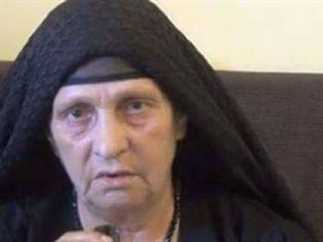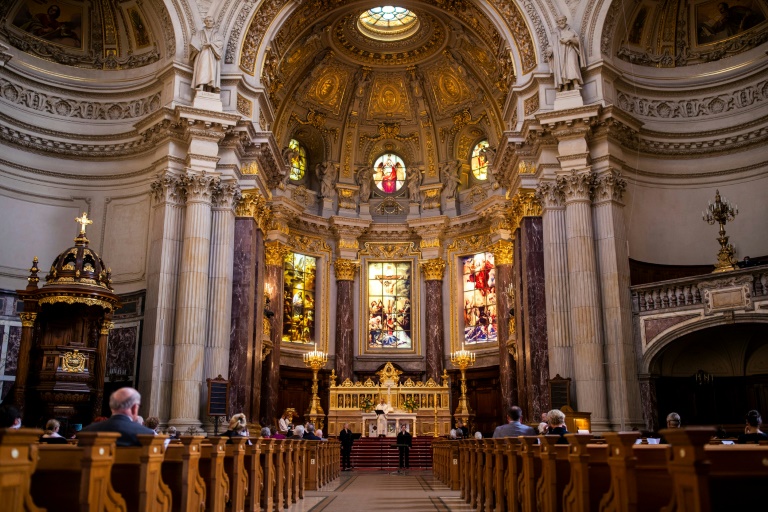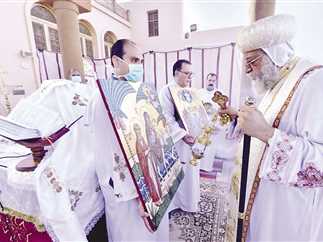Members of the Coptic community in the working-class neighborhood of Imbaba in northwest Cairo are forming groups for self-defense after recent sectarian clashes left 12 dead and hundreds injured.
Copts in Imbaba, who expect more clashes in coming months, say they have organized small groups to protect churches as well as homes and businesses owned by Copts.
The clashes broke out Saturday night after a group of Muslims attempted to storm a church under the pretext of rescuing a Christian woman who allegedly converted to Islam and was held captive in a local church. A second church was set on fire.
A small group of Copts who gathered near the US Embassy in Cairo on Sunday called for international protection of Egypt's Christian community and criticized the government for not doing more to protect them.
Sunday night, thousands of protesters staged a sit-in front of the state TV building calling for immediate investigation into the clashes and church burning.
Tens of Copts gathered inside the church at the center of the clashes while the army blocked nearby streets.
“We haven’t slept since yesterday,” said Raouf Naguib, a young man inside the Saint Mina Church. “We are gathered here to protect our church even with the presence of the army.”
This is the second time in recent years that Copts have taken up arms to protect religious sites. In 2008, Copts defended the Abu Fana Monastery in the Western Desert after it was attacked.
Erian Aziz, a retired military officer, said that he tried to negotiate with the mob and convince it that the church was not hiding anyone, but he was unsuccessful.
“The angry Muslim mob grew larger and we heard the sound of bullets from every corner and then they started to attack the church and Copt-owned stores,” Aziz said.
Eyewitnesses to the clashes said that the initial gathering was small, but grew after Copts fired bullets into the air to disperse the crowd.
Imbaba is a stronghold of Cairo’s Coptic minority. Within a space of three blocks, there are five Coptic churches and four Anglican churches.
The ruling Supreme Council of the Armed Forces said on Sunday that 190 people were arrested in connection with Saturday's clashes, “as a deterrent to all those who think of toying with the potential of this nation."
On Sunday the military increased its presence in Imbaba, cordoning off the area around the church of al-Wehda and sending military police to guard other churches.
Copts account for up to 10 percent of Egypt's population of 85 million and frequently complain of discrimination. During the Mubarak era, they were frequent targets of sectarian attacks.
Sectarian violence has increased since former President Hosni Mubarak’s ouster on 11 February. In March, a church in Atfeeh, Helwan, was set on fire by an angry Muslim mob. In the same month, dozens of Copts were shot dead in street clashes that took place in the Cairo neighborhood of Moqattam.
Saturday’s clashes came hours after a TV interview with Kamilia Shehata, a Coptic woman who some Muslims allege converted to Islam and is now being held against her will by the Church. Shehata appeared on Al-Haya, a Christian channel broadcast from the US, and said that she has not converted to Islam.
She was a major focus for Salafi activism in 2010, with several marches in Alexandria calling for her release and attacks on Coptic Pope Shenouda III. Last month Salafis held a massive protest in front of the Ministry of Defense calling for Shehata’s release. In another march they threatened to attack churches and mosques in order to free her.
Experts argue that the rise of Salafis and other Islamic factions could ignite sectarian violence in the country after the fall of Mubarak’s regime.
Mohamed Hassan, a prominent Salafi figure, is taking much of the blame. Hassan has, controversially, mediated a number of recent sectarian conflicts in Egypt, but is also widely seen as a provocateur.
“I want to tell Mohamed Hassan that you are the reason for all of this,” said Atef Erian, a young Copt in Imbaba who was injured in yesterday’s clashes. “Please don’t worsen the relations between Muslims and Copts with your harebrained ideas.”
“He and like-minded sheikhs were behind the whole case of Kamilia Shehata, and then he pretends to be a peaceful man seeking to bridge the differences between Muslims and Copts,” added Erian.
Mar Mina, a priest at the Mar Mina church, expressed his own concerns after the fighting in Imbaba. “Now we are really afraid,” he said. “They are people who are systematically attacking us and there are no police or military to protect us.”
Despite their agreement that the former president was corrupt, some Coptic voices say they felt safer under his rule.
“At least you didn’t have that nightmare where you are concerned now with protecting your family and your churches. During Mubarak we were safer,” Aziz said.




